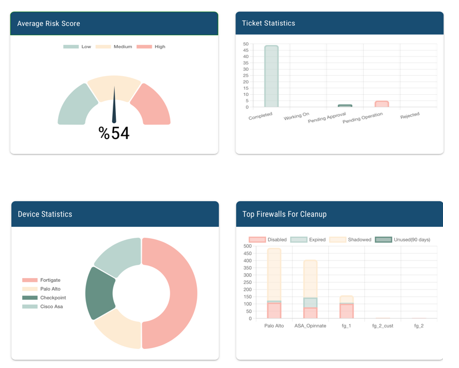Policy Management in Cloud and Hybrid Networks
Problem
As cloud adoption has progressed in our industry, certain trends and preferences have become apparent. Many companies prefer to have hybrid networks, combining on-premise and cloud networks. A good number of companies choose to have both public and private cloud networks rather than relying on just one. The use of multiple cloud service providers is common. While managing inherently different networks is a challenge in itself, managing network security and access policies across on-premise firewalls, cloud firewalls, micro-segmented networks, and microservices environments poses unique challenges for network security professionals.
Unified Network Security Policy Management
Siloed policy visibility and management across different networks and cloud providers are time-consuming, prone to errors, and often unachievable due to limitations of time and human resources. The lack of unified network security policy management increases the risk of cyber breaches and business downtime. Network teams should be able to manage their security policies across their private and public cloud platforms, and on-premise network security seamlessly.
Unified Network Security Policy Management
Siloed policy visibility and management across different networks and cloud providers are time-consuming, prone to errors, and often unachievable due to limitations of time and human resources. The lack of unified network security policy management increases the risk of cyber breaches and business downtime. Network teams should be able to manage their security policies across their private and public cloud platforms, and on-premise network security seamlessly.
Unified Network Security Policy Management with Opinnate
Opinnate provides rule analysis, visibility, optimization, and change automation functionalities for cloud platforms. Using Opinnate, you can:
- gain deep, real-time visibility across your cloud firewalls and micro-segmentation policy set.
- quickly and easily apply complex policy searches on multiple cloud and on-premise networks.
- identify and resolve conflicting, duplicate, or violating rules with ease.
- automate the change management process.
- ensure and prove compliance.

Why Opinnate?
What are the differences?
- All-in-one policy management
- No need for a management product from any firewall vendor
- More use case scenarios for real needs
- Short deployment and enablement
Why are these good for you?
- Lower TCO
- A comprehensive but simpler-to-use solution
- Less dependency to tools (Firewall management consoles, firewall analyzer)
- Less resource usage


